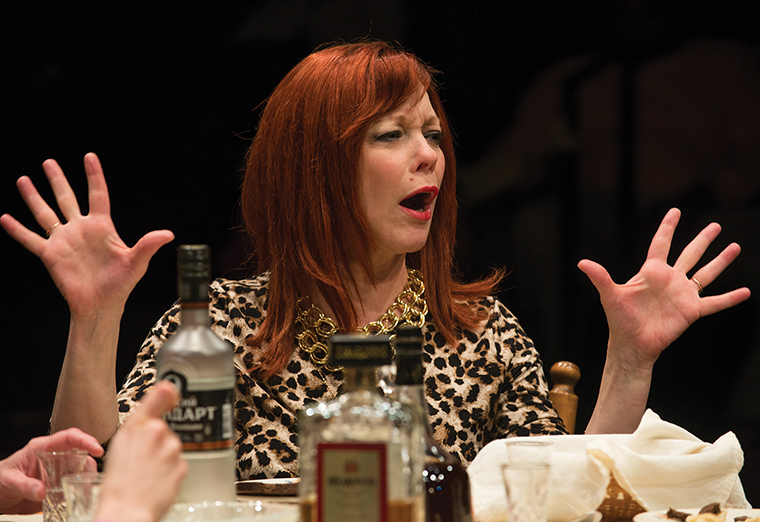Play about immigrant struggles touches audiences
March 10, 2014
Seen as the ultimate melting pot of old and new, America has long been a destination for immigrants dreaming of success and opportunity. Steppenwolf Theatre’s new production “Russian Transport” explores the dark underside of the American dream through the vantage point of first generation Russian immigrants struggling to build a happy home in a new country.
Playwright Erika Sheffer packs audiences into a Sheepshead Bay row house in Brooklyn, N.Y., and offers plenty of laughs and an ending that will have viewers digging their fingernails into the armrests at Steppenwolf Theatre, 1650 N. Halsted St.
“Russian Transport” succeeds in painting a deeply emotional portrait of immigrant life in America where each choice threatens the balance of success and failure and family ranks above all else. Through the subtle yet thoughtful choices of the ensemble members and the meticulous direction of Yasen Peyankov, “Russian Transport” is a play worth seeing, and more importantly, a play worth thinking about.
Representative of a modern-day immigrant family, the play shows a generational gap between parents from the old country and their Americanized children. Patriarch Misha (Alan Wilder) runs a struggling car service, which he hopes to pass on to his drug-dealing son, Alex (Aaron Himelstein). Misha’s wife, Diana (Mariann Mayberry), who is often seen wearing leopard print, aggressively demands the love of her children. Rebellious Mira, the youngest, is the typical, of bratty teenage girl preoccupied with the present—running around kissing boys and complaining about strict rules. Between quips about money, alcohol and love, the family is constantly at odds, trying to blend the social traditions of Russia with the cultural norms of America.
Sheffer drew on her own experiences as an immigrant’s daughter to write the show, and while her life was not as hectic as the lives of her characters, the desire to live out the American dream is likely one that she relates to.
The extensive use of the Russian language within the script often leads to gaps in understanding among audience members. However, the language barrier does not distract from the troubled marriage of Diana and Misha, who show that most arguments are recognizable in any language.
Himelstein’s portrayal of the eldest son, Alex, is emotionally complex. Determined to help his family keep their heads above water financially, his body language is more telling than his own dialogue. As Act One comes to a close, Alex clutches his sister in an attempt to protect her from the evils he has seen. The gesture is heartwarming and traumatizing, a direct nod to where the plot leads next.
Melanie Neilan’s portrayal of the annoying Mira is limited by the lack of details supplied by the script. Judging from the stock photos of boy bands and puppies adorning her bedroom door, Mira represents the stereotype of an immigrant’s daughter without a fully fleshed out identity.
As the story begins, viewers find Diana and Mira arguing about wearing bras. While the screaming match seems trivial, the real issue at hand is an impending visit of antagonistic, leather-clad and gun-toting Uncle Boris (Tim Hopper).
The audience may find him charming, but Boris exists to shake the foundation this family has built since their arrival in America. He is a physical representation of the desperate measures immigrants take to protect their loved ones. Hopper’s portrayal of this mysterious figure may include common villain characteristics, but he plays the role with refreshing depth and compassion. Remembering that Boris is the bad guy despite his redeeming qualities could be the audience’s greatest struggle.
Beyond the physical limitations of the space, the play sits uncomfortably within the pit of the stomach. While the playbill shows an image of Misha and Boris sharing a laugh, such scenes of happiness are rarely seen in the show itself. The sinking feeling that accompanies its most emotional scenes is not a failure of the cast or the writer because discomfort is intended. There will be no happy endings here. Although the topics dealt with in “Russian Transport” are not for the faint of heart, the play is full of deeply felt moments that make for a memorable experience.
Despite its missteps, “Russian Transport” ultimately excels in its Chicago debut as a timeless story of immigrants just trying to keep their own American dream alive, regardless of what the consequences might be.








